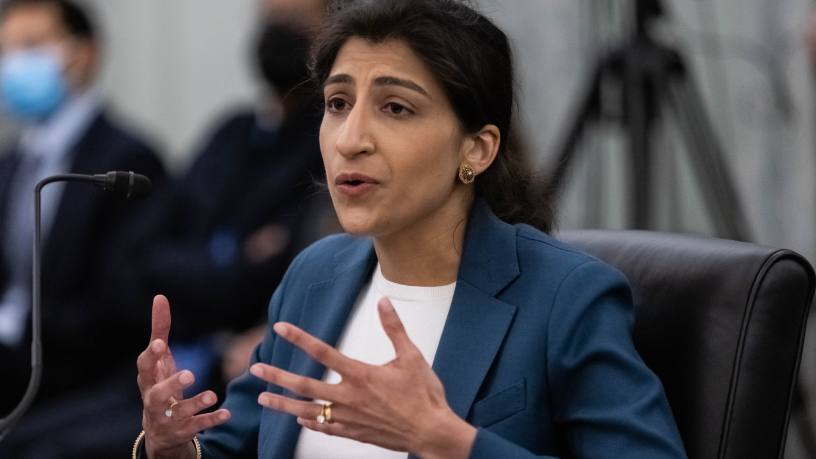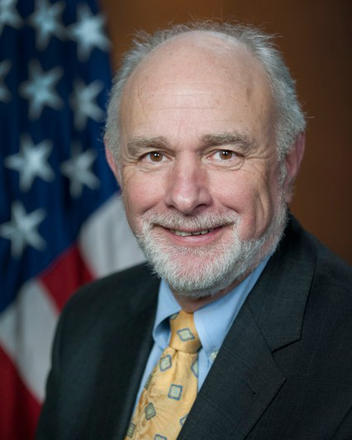After 40 years of largely light-touch US antitrust enforcement — including decades when Silicon Valley darlings, such as Facebook, Google and Apple, benefitted — the US president, Joe Biden, has drawn a line in the sand.
With the implementation of Mr Biden’s new policy, the government is tightening its control over mergers and acquisitions, and is expected to challenge more activity and business plans in this area — and potentially even break up or ring-fence businesses in giant companies.
Change of direction
One clear sign of the change is Mr Biden’s nomination of Lina Khan — a known critic of ‘big tech’ and associate professor at Columbia Law School — as chair of the Federal Trade Commission (FTC).
The FTC, one of two antitrust enforcement agencies in the US, has the power to scrutinise mergers, write new guidelines on mergers and competition policy, and investigate and sue companies. She is also well connected within Congress; in 2019, she was hired as counsel to the House antitrust committee to advise on a high-profile investigation into big tech companies. In June 2021, the Senate confirmed her nomination to head the FTC in an overwhelming bipartisan vote, with 21 Republicans supporting her.
There is more dissatisfaction with the antitrust status quo than at any point in my lifetime
For the second enforcer, the assistant attorney general for antitrust at the US Department of Justice (DoJ), Mr Biden nominated Jonathan Kanter. Mr Kanter is an experienced antitrust lawyer and head of a law firm that has led private lawsuits against several big tech companies; for example, he helped the government and several US states pursue a case against Google last year.
New barons
The appointments stand out because the two are both prominent voices of a movement that advocates a return to a more robust antitrust enforcement regime, reminiscent of the century-old, trust-busting days of the ‘Gilded Age’ when a former Supreme Court judge, Louis Brandeis, did battle with the so-called “robber barons”, the likes of John D Rockefeller of Standard Oil, John Pierpont Morgan of Northern Securities railroad company and Andrew Carnegie of US Steel.
The terms ‘trust-busting’ and ‘antitrust’ originated from the late nineteenth and early twentieth century efforts to break apart corporate trusts, which large corporations had used as a mechanism to monopolise power. New Brandeisians, as they call themselves, frequently draw parallels between those behemoths of the past and todays’ dominant, winner-takes-all platforms of Facebook, Apple, Amazon and Google.
What is central to the new progressive view, former antirust officials and commentators say, is that antitrust enforcement was originally an effort to protect small businesses and working families from ‘big business’; and this established a philosophy that antitrust enforcement must have egalitarian goals, beyond strictly economic considerations, that focus on the public interest.
The new movement takes a broad view of the harms that can be caused by anti-competitive conduct by large corporations and their potential monopoly of power. Indeed, it is not only consumers that need to be protected, but also rival companies, small businesses, workers, entrepreneurs and, ultimately, democracy itself, its advocates say. In a 2018 essay Ms Khan published in the Journal of European Competition Law and Practice entitled ‘The New Brandeis Movement: America’s anti-monopoly debate’, she stated that a fundamental belief of the movement is that “anti-monopoly is a key tool and philosophical underpinning for structuring society on a democratic foundation”.
Looking out for the little guy
Mr Biden has also named Tim Wu, who is prominent in the movement and a Columbia Law School professor, as special assistant for technology and competition policy at the White House National Economic Council. In that role, Mr Wu helped write a July executive order on promoting competition in the US economy which lists more than 70 actions by a series of regulators aimed at curbing alleged excessive concentration in practically every corner of the economy. This includes the internet platform industry, agriculture, healthcare, financial services and airlines.
Following on from this order, the FTC and DoJ are jointly reviewing their horizontal and vertical merger guidelines, with the aim of increasing scrutiny and possibly writing more robust rules. The FTC, for instance, has re-introduced a rule that gives the commission veto power over a company’s future transactions once it has attempted a supposed anti-competitive merger or acquisition. Bank regulators have started a similar effort, in line with Mr Biden’s directive, updating guidelines and increasing scrutiny, with a view to probably requiring a more detailed public interest guideline that a bank merger will not harm communities and, in particular, that small business lending will not decline.
Chris Cole, executive vice-president of the Independent Community Bankers of America, an association of small banks, says such an emphasis is necessary. A decline in banking services in rural areas, and in marginalised communities and low-income families — as well as a reduction in small business loans — following increased bank consolidation over the past 15 years, “will be aggravated if we continue to see consolidation at the rate we’re seeing,” he notes. If regulators evaluate the potential harm to small business lending, or the lack of it, when reviewing bank mergers, “that would help, I think, stop the consolidation or, at least, slow it down,” he adds.
According to the Federal Financial Institutions Examination Council, the number of US banks has shrunk by about 10,000 since the mid-1980s, in part because of failures, but mainly due to mergers. Meanwhile, not a single bank merger application was denied by regulators over the past 15 years, according to the Biden order, based on research by Jeremy Kress, a Michigan University professor who had previously worked on bank merger oversight at the Federal Reserve.
Born of regulatory failings
Few question that a major concern of the New Brandeis movement is the astonishing rise of big tech, whose impact on social, economic and political systems was magnified during the Covid-19 pandemic. However, the momentum for a far-reaching transformation in antitrust, former antitrust officials say, originated with the 2008 financial shock, when many people lost their jobs and their homes, creating a strong view that government regulators had failed grievously.
Today’s impetus for more robust antitrust curbs is a far cry from the 1970s, when the pendulum swung in the other direction and there was a consensus that antitrust enforcement had gone too far. At the time, economists, believing in the superiority of the private sector over the public and that free-market forces would inevitably correct efforts by business to wield harmful monopoly power, argued that antitrust made it difficult for companies to carry out profitable and efficiency-making business mergers and activities, and that such government intervention hindered growth.
Agencies will have a greater ability to challenge horizontal and vertical transactions
Leading the disaffection, conservative economists from the University of Chicago — and especially their chief spokesperson, Robert Bork, a graduate of the university’s law school — established a narrow and micro-economy-focused antitrust framework.
In 1978, Mr Bork wrote ‘The antitrust paradox: a policy at war with itself’ — which stated: “The only legitimate goal of American antitrust law is the maximisation of consumer welfare.” This meant, according to experts and commentators, that enforcers ought to only drill down on price and only worry about how companies’ mergers and conduct alter the prices consumers pay for goods and services.
Fast forward to a developing consensus today and critics of the Chicago School’s narrow antitrust standard — which has influenced court rulings over four decades — say the main problems are what it gets wrong and what it omits.
For instance, according to William Baer, who led antitrust at the DoJ during former president Barack Obama’s administration, critics of the Chicago School believe the “consumer welfare” standard is really about “shareholder welfare” and the maximisation of shareholder profits, and that just about anything a company does will generate efficiencies, whether that is buying a downstream distributor, a rival or a nascent competitor. But, says Mr Baer, “the evidence that most markets are sufficiently competitive, and that those efficiencies and savings are invariably passed from a corporation to a consumer, is very limited and just cannot be presumed.”
More than money
Second, critics say, the price effect on consumers should not be the only focus of antitrust and competition policy.
In addition, Ms Khan and other experts argue that the narrow focus on “consumer welfare” lets tech giants escape scrutiny, as the price consumers pay for going online is not monetary.
Meanwhile, several possible areas of market abuse, or monopoly power by companies, largely ignored by the Chicago School antitrust definition, were raised in Mr Biden’s executive order. One example is monopsony, or the power of large buyer groups, which the order says harms US agriculture. The order also says that much more needs to be done to stop agreements between companies and workers that are aimed at suppressing wages. Additionally, the idea that vertical integration could be damaging to competition was excluded by the Chicago School definition; the only horizontal mergers — combinations between direct competitors — that it thought worthy of scrutiny are those between significant competitors.
Proving antitrust
One important legacy of the Chicago School is that it holds government actions in the courts to a very high standard of proof, insisting that enforcers should not bring cases unless they are highly confident that they can show a price effect. It also claims that courts should be very demanding when scrutinising the government’s evidence before finding in its favour, whether it be a merger challenge or a challenge to conduct by a company with market or monopoly power.
Mr Biden can count on bipartisan support in Congress in his endeavour to make antitrust enforcement more robust. Existing antitrust law has led Democrats to focus on income inequality and stagnation among low-paid workers over the past several decades, and Republicans to be mainly concerned about dominant companies that face little or no competition, both in the tech platform industry and elsewhere.
“There is more dissatisfaction with the antitrust status quo, with the nature of competition in the US marketplace, than at any point in my lifetime,” Mr Baer affirms. “It is one area where there is more bipartisan dissatisfaction than just about any other area of public policy.” But whether that dissatisfaction translates into an affirmative legislative agenda is an open question.
A significant development is that, in mid-October, the Senate Judiciary Committee said it would soon be unveiling a bipartisan antitrust bill, the American Innovation and Choice Online Act, which shares the name and focus of one of six bills passed with bipartisan support by the House during the past six months. The bill would forbid dominant online platforms from engaging in discriminatory conduct, including taking advantage of their gatekeeper power to obstruct rivals and giving preference to their own products over others. This would have a considerable impact on the likes of Facebook, Google, Apple and Amazon, which control huge networks of information and products, while simultaneously selling their own products.
Mr Baer says: “I think there is some bipartisan support both in the House and the Senate … to change standards a little bit, to direct the courts to go back to the original intent of Congress (before the 1970s), to be more suspicious of business, and address tendencies of overconcentration in markets and for market power to be created.”
William Kovacic, a former chair, commissioner and general counsel at the FTC, believes there will be substantive change, starting with changes to the regime for dominant online platform companies, but also enhancing the mechanisms for merger control. “It will be clear in the reforms that agencies will have a greater ability to challenge horizontal and vertical transactions,” he says.
Against this background, David Segal, founder and director of the activist publication Demand Progress, says there is “a lot of concerning precedent in the courts around the primacy of the consumer welfare standard and the way that has been interpreted”.
But according to Mr Kovacic, there has also been caution within the agencies that reflects, in part, a concern that if they brought cases to court they would lose. “Having a greater appetite for risk is perhaps necessary to challenge the courts to think about their approach and, ultimately, as a background to possible legislative reforms — at least to tell Congress we’ve tried in the courts … we are not having success; we need better tools,” he says.
Certainly, the new head of the FTC, Ms Khan, seems willing to take up the fight. In August she re-filed a lawsuit that was first submitted in December 2020 and thrown out by a US judge in June 2021 — this time in more detail. The claim is that Facebook created an illegal monopoly by suppressing competition when it bought Instagram in 2012 and WhatsApp in 2014, and by cutting off other rivals from accessing its vast user database.
The FTC argues that Facebook should be broken up. In October, Facebook filed a motion to dismiss the FTC’s revised antitrust lawsuit against the company, saying the agency’s complaint still lacked evidence that the company had broken antitrust laws. The judge has until mid-November to respond to the company’s motion to dismiss the case, with no announcement at the time of press.














